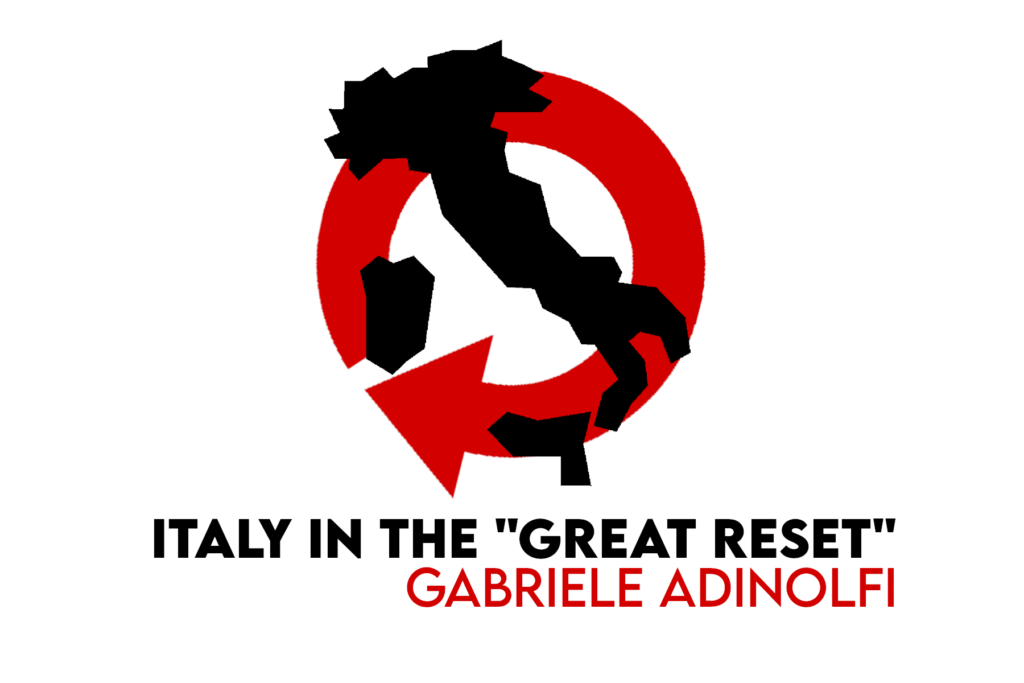Gabriele Adinolfi: Salvini, Draghi and the Lega – Italy in the „Great Reset”

In determining whether or not the League has betrayed its constituents, the first element to consider is their sentiment. The increase in consensus for the League after the Draghi vote doubled compared to that for Fratelli d´Italia (Brothers of Italy) which chose to stay out of the new government.
Why should the League’s choice be seen as a betrayal? Such is the perception of what in sociology are called subcultures. In modern communication, social ghettos are created and within these social ghettos some users mutually influence one another, altering the perception of parties and politicians (Salvini, Trump, Putin, Orban) as they see fit. They reject anything that contradicts their vision and emphasize what is important to them. Thus they believe that the success of these parties or politicians is due to the reasons that the users of the social ghettos regard as fundamental and, when reality brings down their illusion, they believe the voters have been betrayed and will turn against the traitors. But this only lies in the false perception of reality within social ghettos.
The League, the euro and Europe
Salvini’s battle to exit the euro lasted a year, from 2016 to 2017. Considering how this line penalized Marine Le Pen in the presidential election, Salvini abruptly gave it up.
It must also be said that this demagogic campaign was launched by a League which was at its lowest historical result (4%), when it was marginal and could afford to say what it wanted.
However, the League has returned to rule the productive Italian regions, to represent industries, tourism, commerce and there, if anyone proposes to leave the Euro, they call a psychiatric clinic right away.
The social ghettos did not understand this because there are still three or four representatives of the League who play the no euro game and anti-Germans and, as usual, the social users confuse those who come to fish in their environment with the movement which as a whole does not hold these positions at all.
It must also be said that sovereignism is closely kept track of by English lodges; lodges who wish weakness upon Italy and Europe, and therefore their support is along anti-euro lines.
The main character of the City and the Stock Exchange party close to the Lega is Paolo Savona, who was one of the architects of the separation between the Bank of Italy and the Treasury and one of the standard bearers of privatizations. Its task is not to get us out of the euro, but to sabotage Europe’s economic power. The British octopus of sovereignism in support of the dollar and the pound is not in the League, it operates outside it (Paragone, Giubilei, Fusaro). Within the League, the biggest critic of the euro and of Europe is Alberto Bagnai, the man who publicly celebrates the bombing of Dresden. At a much lower level in the hierarchy are Borghi and Rinaldi, whose impact in the League and on the League electorate is insignificant but who are imagined by the social ghettos as leaders of the League.
Draghi and Italians
Draghi won 86% of the vote in the Senate and 89% of the vote in Parliament.
The Italians’ consensus for Draghi is lower than that expressed by the parties, but it is just slightly lower, as it approaches 80%.
Draghi is regarded as the man who succeeded in overcoming the central bank’s austerity line and helping the Italian economy. Italians who continue to be called Eurosceptics abroad are not Eurosceptics at all. It is necessary to understand the Italian mentality and the comic expression of politics.
In Italy, by tradition, the State is something foreign to everyday life: it is cursed by paying taxes but it is invoked for economic aid and employment.
It’s like dealing with a grandfather who considers himself rich and from whom you hope to get something but are very reluctant to stay with him.
The Christian Democrats had an unbroken majority for fifty years, but then meeting someone who claimed to vote for DC was rarer than finding a four-leaf clover. With a trade union mentality, Italians tend to criticize what they actually vote for, but because they believe that in doing so their support will seem decisive and that they can demand and get more from their lord.
The relationship with the EU on the part of the Italians is exactly the same. It is passive Europeanism.
Ever since Merkel forced Europeans to help restore the Italian economy, Italians have deluded themselves that they can put themselves back on the shoulders of others and believe Draghi has the authority to make this happen at a limited cost.
Considering also how amateurish the two governments chaired by Conte have been, the consensus for Draghi is only inferior in Italian history to that of Mussolini.
Italy and comedy
Every people has its comedies and democracy is the comedy par excellence.
No comedy is serious. But comedies are different from country to country. In France, the tendency is to boast, in Italy it is to be boisterous.
The fanfaron should respect the role he is playing as much as possible, the histrion changes roles without problems and takes on a different role every second.
The unlikely Italian unity behind Draghi is incomprehensible elsewhere. That Salvini meets with the leaders of the Democratic Party and gets ready to govern with them. That Salvini speaks with the Minister of the Interior who took his place against him and draws a common line, that Borghi fabricated that Draghi is a “sovereignist”, are antics which would not be possible anywhere else in the world but which in Italy are very normal, as Sordi and Gassman’s films show.
The League and Draghi
It is not known exactly what Draghi will try to do or whether he will succeed. For my part, I hope that this will fail for a simple reason: I believe that now it takes the blackest and most violent catastrophe in Italy for a shock effect to occur that could, perhaps, bring to life the italic virtues in a person because today Italy is, collectively, an immense buffoonery.
In any case, to imagine what Draghi will try to do, we must abandon all the clichés going on in the social ghettos. Draghi does not want to „liquidate” Italy for a bad German or French boss and does not want to bankrupt it. On the contrary, he wants to rationalize spending, control income and restart production. Which is not at all contrary to the so-called big Davos reset because, if you read their preliminary documents, they are concerned about the health of productive businesses; for the simple reason that whoever feeds on the blood of another, when he dies, must give him robust transfusions.
Draghi is not yet at work, but some data is emerging. The political weight of the right, and of Berlusconi in particular, is very strong. Draghi wants to engage in a standoff with the Italian parasitic deep state, and the choice of Brunetta as minister of public administration confirms this. Three ministries went to the League, two of which are of strategic importance both to the economy and to the party’s electorate. These are the Ministry of Tourism, which goes to Massimo Garvaglia and the Ministry of Economic Development, which goes to Giancarlo Giorgetti, who grew up at MSI (Italian Social Movement, post-fascist national right).
Whether it wins or loses, the League therefore has all the credentials to play its game well. If this match succeeds, the League will triumph. What if it’s a lost game? Not much would happen: it would then play another game. The Italian political transformism and the mentality with which the comedy is lived in our country will allow any other new perilous leap. Let us not forget that the League has been alternately secessionist, autonomist, sovereignist and Europeanist and that, changing its mask, it has always remained in the saddle. Quite simply because it is the expression of productive territories and social classes penalized by the deep state and bureaucracy. Therefore, it risks little or nothing in its new investment.
Source: strategika.fr
The above translation is the property of 3droga.pl. Copying it or modifying it without the permission of the editors is prohibited.
Translation: Michał Szymański
Graphic design: Resistance Arts


